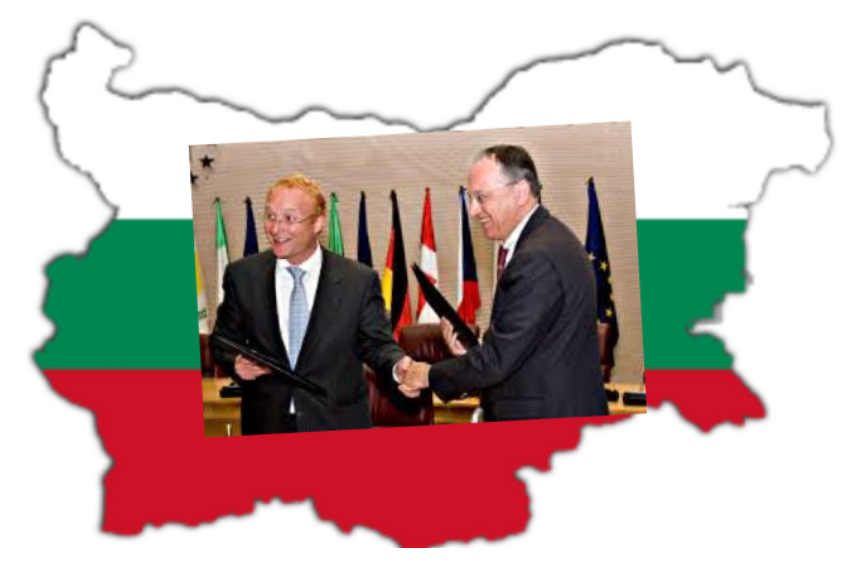
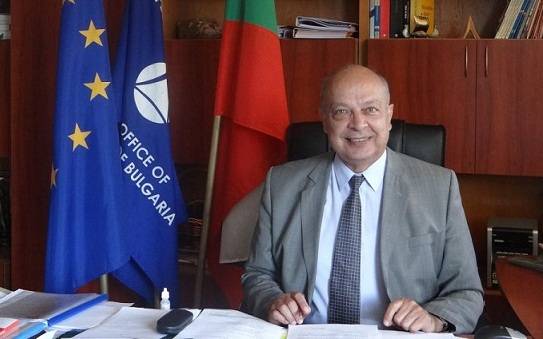
Head of the Bulgarian delegation in June 2013: Kamen Veselinov
In this part the focus is on the Bulgarian delegation, which in June 2013 was headed by Kamen Veselinov, Director-General of the Bulgarian Patent Office (BPO).
"Some time after he had played his part in rubber-stamping Battistelli's "Strike Regulations", Veselinov was relieved of his position as head of the BPO in March 2014."According to€ a bulletin [PDF]€ published by€ ipbulgaria.bg, Veselinov held the position without the required professional experience and under his leadership€ “the office was brought to a severe crisis" and "as a result of his mismanagement, Bulgaria is on the US Special 301 blacklist”.
Veselinov was replaced by Tanya Naydenova, a graduate in law from the Mikhail Lomonosov Moscow State University who headed the BPO between March and December 2014.
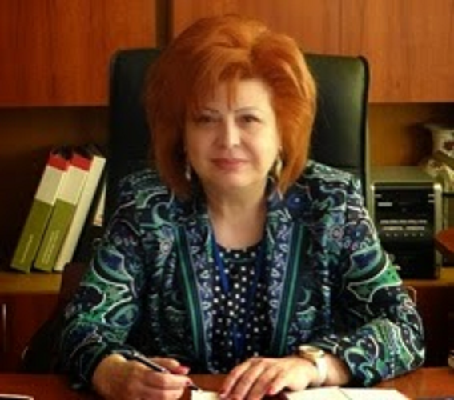
Tanya Naydenova headed the BPO for a brief period between March and December 2014.
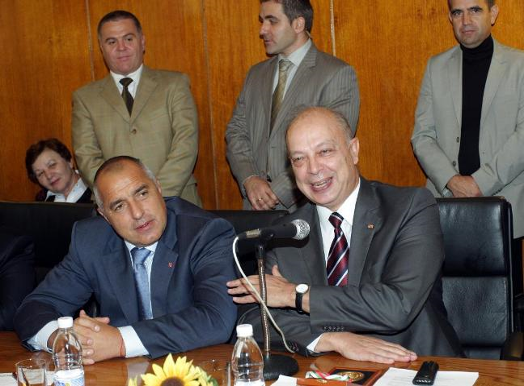
Veselinov and his political patron, Bulgarian Prime Minister Boyko Borisov.
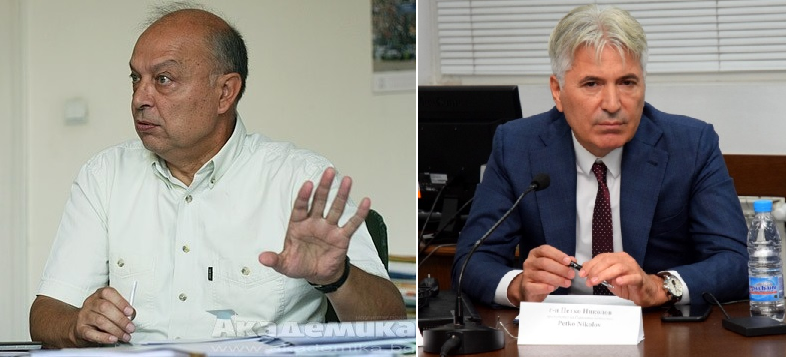
Temporarily ousted, Veselinov (left) was reinstated after Boyko Borisov came to power towards the end of 2014. He continued to serve as head of the BPO until the summer of 2016 when he was replaced by Petko Nikolov (right), chairman of the national anti-trust authority.
[PDF] as head of the BPO was Petko Nikolov who was born in 1958 in Botevgrad in western Bulgaria. According to the Bulgarian media, Nikolov graduated in law from Sofia University, has a master's degree in finance from the University of Veliko Tarnovo, as well as a specialization in criminal law from the University of Sofia.€ He also has a doctorate in economics.
"But it turned out that Veselinov had only been temporarily ousted."Nikolov initially worked as an attorney until 2001 when he entered politics as a member of the National Movement for Stability and Progress (NDSV), originally known as the "National Movement Simeon II". The NDSV is a liberal, populist political party created as the personal political vehicle of Simeon Saxe-Coburg-Gotha, the deposed heir to the throne of the Kingdom of Bulgaria who succeeded in making a post-communist political comeback as Prime Minister between 2001 and 2005.
Nikolov's first important public sector appointment was as chairman of the Supervisory Board of the Privatization Agency in 2001, under the "Sakskoburggotski government" - or so-called "Tsar's cabinet" - presided over by Simeon von Saxe-Coburg-Gotha. According to media reports, Nikolov obtained his position on the Supervisory Board "as part of the quota of the Simeon II National Movement".
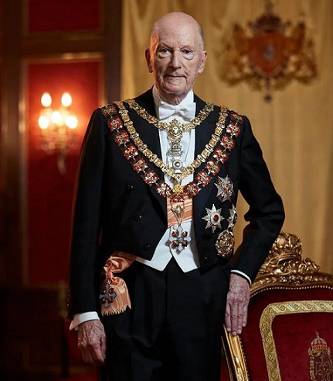
Petko Nikolov's original political patron, Simeon von Saxe-Coburg-Gotha.
[PDF], somehow managing to survive six different governments. In the turbulent and unstable world of Bulgarian politics that is no small achievement.
"In 2003, Nikolov's career took another leap forward when he was appointed chairman of the Commission for Protection of Competition (CPC), a position which he held for nearly 13 years, somehow managing to survive six different governments."Nikolov's second term as head of the CPC had officially expired in October 2015 and a legislative amendment earlier that year prevented him from serving a further consecutive term. Nevertheless, due to political wrangling over his successor, he remained in charge of the antitrust authority on a caretaker basis until the summer of 2016.
Before he was replaced at the CPC, rumours began circulating that "out of gratitude for the work done, GERB [the political party of Prime Minister Boyko Borisov] would provide him with a new appetizing position".
"His previous track record as chairman of the anti-trust authority CPC also came in for criticism."His subsequent appointment as head of the BPO attracted a lot of critical comment in Bulgaria where it was reported that he had been parachuted into the position directly by Prime Minister Boyko Borisov without an open competition. [PDF]
His previous track record as chairman of the anti-trust authority CPC also came in for criticism. This criticism centred around claims that Nikolov had been more than favourable to the Bulgarian politician, media mogul [PDF], and oligarch Delyan Peevski in resolving cases which affected Peevski's interests.
Peevski - nicknamed "Shishi" or "Potbelly" in Bulgaria – is a highly controversial figure who was recently sanctioned by the US Department of the Treasury which described him in the following terms:
"Delyan Slavchev Peevski (Peevski) is an oligarch who previously served as a Bulgarian MP and media mogul and has regularly engaged in corruption, using influence peddling and bribes to protect himself from public scrutiny and exert control over key institutions and sectors in Bulgarian society."
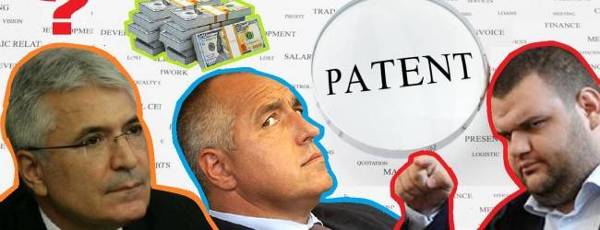
Nikolov's appointment as head of the BPO in 2016 attracted critical comment in Bulgaria.
From left to right: Petko Nikolov, Bulgarian PM Boyko Borisov and oligarch Delyan Peevski.
"Given his political allegiance to the monarchistically flavoured NDSV and his reputed subservience to homegrown oligarchs like Peevski, it's hardly surprising that when it came to EPO affairs, Nikolov followed in the footsteps of his predecessor Veselinov and turned out to be another uncritical "facilitator" of the tyrant Battistelli and his vicious assault on the rights of EPO staff."Given his political allegiance to the monarchistically flavoured NDSV and his reputed subservience to homegrown oligarchs like Peevski, it's hardly surprising that when it came to EPO affairs, Nikolov followed in the footsteps of his predecessor Veselinov and turned out to be another uncritical "facilitator" of the tyrant Battistelli and his vicious assault on the rights of EPO staff.
In return, Battistelli did his best to cultivate the goodwill of his Bulgarian vassals. In November 2017 (warning: epo.org link), he dispatched his faithful lieutenant Raimund Lutz to deputise for him at the 27th Patent Information Conference which took place in Sofia.
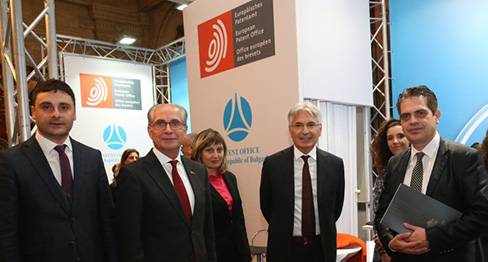
From l. to r.: David Sukalinski (BPO), EPO Vice-President Lutz, Ofelia Kirkoryan-Tsonkova (BPO), Petko Nikolov (BPO), and Deputy Minister for Economic Affairs, Lachezar Borosov (November 2017).
epo.org link) where he met with Nikolov and various government ministers, including the Deputy Minister for Economic Affairs, Lachezar Borisov.

From l. to r.: Battistelli with Lachezar Borisov and Petko Nikolov (March 2018).
[PDF] by Vladya Borisova [PDF] following a decision issued by the caretaker government of Stefan Yanev.
"More recently, in June 2021, sources in Bulgaria reported that Nikolov had been replaced by Vladya Borisova following a decision issued by the caretaker government of Stefan Yanev."No reasons were given for Nikolov's departure, but it seems that he was "purged" due to his close connections to previous government led by Boyko Borisov. That government had fallen into disfavour and triggered widespread public protests which lasted from July 2020 until April 2021, when Borisov and his cabinet finally resigned at the end of their four-year term.
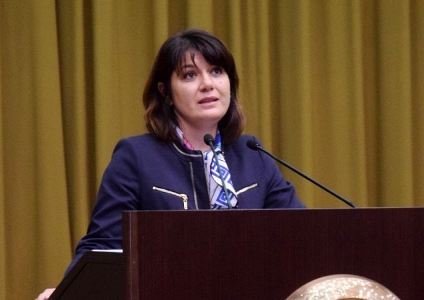
The new head of the Bulgarian Patent Office, Vladya Borisova.
"Prior to her current appointment, the new head of the Bulgarian Patent Office, Vladya Borisova, was a professor at the Institute of Intellectual Property and Technology Transfer (IIPTT) in Sofia."The University of National and World Economy (UNWE), which was originally established in 1920 as the Free University of Political and Economic Sciences, claims to be the largest and oldest institute for higher economic studies in Bulgaria and Southeastern Europe. During the communist era it was known as the Karl Marx Higher Institute of Economics and it was given its present post-communist name in 1990.
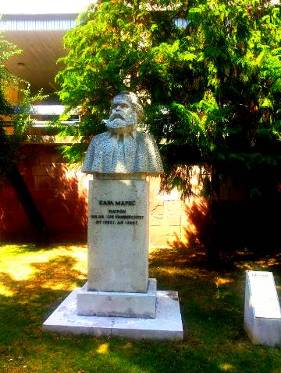
Bust of former "patron" Karl Marx on the UNWE grounds in Sofia.
"Maybe she will surprise us all and make a stand for the rights of EPO staff. But don’t hold your breath on that."In the present era of unfettered globalised capitalism, the subject of workers' rights seems to be an unfashionable topic of discussion, whether at the UNWE in Sofia or at the EPO in Munich. One wonders what the UNWE's former "patron" Karl Marx would have made of it all...
In the next part we will turn our attention to the delegation representing Bulgaria's northern neighbour, Romania. ⬆
